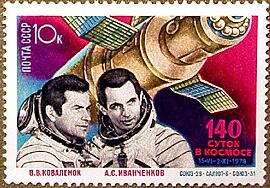Aleksandr Sergeyevich Ivanchenkov (Russian: Алекса́ндр Серге́евич Иванче́нков; born 28 September 1940) is a retired Soviet cosmonaut who flew as Flight Engineer on Soyuz 29 and Soyuz T-6, he spent 147 days, 12 hours and 37 minutes in space.[1]
Aleksandr Sergeyevich Ivanchenkov | |
|---|---|
 Vladimir Kovalyonok and Aleksandr Ivanchenkov on the 1978 Soviet stamp "140 days in space" | |
| Born | 28 September 1940 |
| Status | Retired |
| Nationality | Soviet / Russian |
| Occupation | Engineer |
| Awards | Hero of the Soviet Union (2) Order of Lenin (2) |
| Space career | |
| Cosmonaut | |
Time in space | 147d 12h 37m |
| Selection | Civilian Specialist Group 5 |
Total EVAs | 1 |
Total EVA time | 2 hours 5 minutes |
| Missions | Soyuz 29/Soyuz 31, Soyuz T-6 |
Ivanchenkov first flew on Soyuz 29 in 1978 to the Salyut 6 space station.[2] It was the fifth mission, the fourth successful docking, and the second long-duration crew for the orbiting station. Commander Vladimir Kovalyonok and flight engineer Ivanchenkov established a new space endurance record of 139 days.[3]
Ivanchenkov flew for a second time in 1982 on the Soyuz T-6 mission to the Salyut 7 space station.[4] Along with two Soviet cosmonauts, the crew included a Frenchman, Jean-Loup Chrétien.[4]
Biography
editIvanchenkov is married with one child. He was selected as a cosmonaut on 27 March 1973. He retired on 3 November 1993.[1]
Honours and awards
edit- Twice Hero of the Soviet Union;
- Pilot-Cosmonaut of the USSR;
- Two Orders of Lenin;
- Medal "For Merit in Space Exploration" (Russian Federation);
- Hero of the German Democratic Republic;
- Order of Karl Marx;
- Commander of the Legion of Honour (France);
- Cross of Grunwald 3rd class.
See also
editReferences
edit- ^ a b "Ivanchenkov, Aleksandr Sergeyevich". spacefacts.de. Retrieved 31 March 2023.
- ^ "Soyuz-29". spacefacts.de. Retrieved 31 March 2023.
- ^ Kevia Kloss (3 November 1978). "2 Soviet Cosmonauts Land After Record 139 Days in Orbit". The Washington Post. Retrieved 31 March 2023.
- ^ a b "Mir Hardware Heritage" (PDF). National Aeronautics and Space Administration. Archived from the original (PDF) on 7 September 2009. Retrieved 8 October 2011.
External links
edit